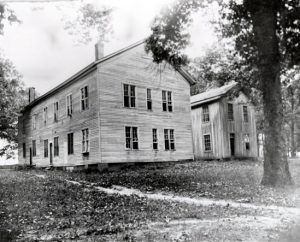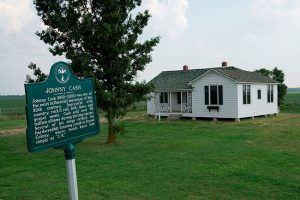calsfoundation@cals.org
Prioritizing Arkansas’s History and Heritage: Worth the Effort
I have spent nearly two decades in some capacity or another engaged in matters of Arkansas history and heritage, and while I have absorbed a wealth of scholarship, and produced some of my own, there is one question about the collective soul of Arkansans whose answer continues to elude me:
Why don’t we take ourselves more seriously?
The question may also be phrased thusly: Why don’t we think we’re worth the effort?
What I mean by this is that Arkansans collectively tend to expect very little from their political or corporate leaders in terms of creating and maintaining institutions and amenities that will better the lives of those who live here. Our commitment to our own well-being can be summed up in the popular phrase “Thank God for Mississippi,” connoting how our efforts constitute the bare minimum for keeping us above dead last.

Let’s look at our twin, Michigan, which became a state in 1837, the year following Arkansas’s own ascension to statehood. Twenty years before statehood, in 1817, the Territory of Michigan already established what is now the University of Michigan, which, by 1866, had become the largest university in the nation. By contrast, what is now the University of Arkansas in Fayetteville was founded in 1871, thirty-five years after Arkansas became a state. Likewise, the 1850 Michigan Constitution (Article 3, Section 11) called for the creation of an agricultural school “as soon as practicable,” and five years later, what is now Michigan State University was established. But Arkansas waited a span of fifty-four years before establishing its four district agricultural high schools—their establishment due largely to the hard work of Governor George Washington Donaghey. But even then, our sole university opposed the measure, not wanting any publicly funded competition in higher education in the state.
Granted, our twin had some distinct advantages in this respect. Michigan’s place in the Upper Midwest connected it to emerging cities like Chicago and Cleveland, and the Great Lakes allowed for significant transportation and economic development well before the arrival of railroads in the 1830s. Too, it entered the Union as a free state and so would not be hindered in its development by the institution of slavery, or later see its people go to wrack and ruin as part of a pitiless war to preserve that institution.
Certainly, the issue of race pervades Arkansas’s own history and helps to explain, in part, the state of the state—leaders did not want to establish institutions that might be of benefit to African Americans, even if those institutions would help their poorer, white constituents. However, other states have been riven by the manufactured conflicts of race and have still managed to foster some form of collective pride. (In Texas, that pride can border on downright arrogance.)
Let’s look at Texas for a moment. The Texas State Historical Association was founded in 1897, with part of its aim being the preservation of archival materials relating to the history of the state. The TSHA published the first two volumes of its famous Handbook of Texas in 1952, followed by supplemental volumes in later years. This formed the basis of the online Handbook of Texas, which launched in 1999 and now has more than 27,000 entries.
By contrast, the Arkansas Historical Association was established in 1903. Two years later, what is now the Arkansas State Archives was founded by the state, and the initial AHA dissolved in 1907, its members confident that the state would take over responsibility for the preservation of history. However, it didn’t work out that way. The Arkansas History Commission, as it was then known, was perpetually poorly funded and did not even have any permanent headquarters until 1915, when space became available in the Arkansas State Capitol, although much of the collection was later moved to a dank basement, rather inaccessible to researchers. The archives did not have actual facilities for preservation and research until 1951. By that time, the reestablished AHA had been active for ten years and was regularly producing a journal of Arkansas history. But I think it is fair to say that the state lacked leadership in preserving and promoting state history and heritage. What is now the Division of Arkansas Heritage was not founded until 1975. Only five years later did the state finally have its own university press, decades after the likes of Oklahoma, Louisiana, Missouri, Mississippi, Tennessee, and Texas—in short, decades after every state bordering us.
Why don’t we think we’re worth the effort? Why don’t we think our history and heritage are worth spending time and money on?
This may be a chicken-and-egg question. We don’t think we’re worth the effort because no one in a position of leadership has seized this as his or her cause and expended political or financial capital on it, and maybe the reason no one has done that is because it simply feels sometimes like Arkansas isn’t worth the bother.

I must lament, with my friend Rex Nelson, the many missed opportunities here. For example, Rex has devoted many a column in the Arkansas Democrat-Gazette to the state’s failure to promote its viticultural region, turning the wineries in and around Altus into the sort of collective destination that could be marketed to people in neighboring states. Mississippi is famously home to the Mississippi Blues Trail and has other marked trails devoted to civil rights, literature, country music, and more. In fact, Mississippi also has a purpose-built museum dedicated to the whole history of the state, something we also still lack. The Elvis Presley Birthplace in Tupelo, Mississippi, opened for tours in 1972, with a museum and events center added in 1992, but in Arkansas, it wasn’t until 2014 when the Historic Dyess Colony: Boyhood Home of Johnny Cash finally opened, an initiative led not by any state agency but, instead, by Dr. Ruth Hawkins at Arkansas State University.

We miss so many opportunities to tell our story to the wider world (and benefit economically from doing so) precisely because, it seems, we Arkansans have been convinced that we lack any real story to tell. Because we don’t understand how stories work. After all, why do tourists seek out fictional places like 221B Baker Street (Sherlock Holmes’s abode) or Platform 9 3/4 at King’s Cross Station (jumping-off point for Harry Potter’s adventures) in London? They know the stories aren’t real, but visiting those places makes those stories come to life. Gillian R. Overing and Marijane Osborn, in Landscape of Desire: Partial Stories of the Medieval Scandinavian World, write, “It seems as though the nature of the story does not matter so much as the fact that a place has a story. A place with a story is special, for those who live there and those who wander there alike.”
In the absence of larger efforts to promote our stories, some private individuals and regional entities have decided to rise to the challenge. For example, attached to Cowie Wine Cellars is the Arkansas Historic Wine Museum, a private project of winery founder Bob Cowie to collect the history of viticulture in the state. And, among other efforts in preserving Arkansas history, the Central Arkansas Library System created and continues to support the CALS Encyclopedia of Arkansas website.
However, for the most part, we here in Arkansas wait around for some foreign investment to lift our people up, or maybe for the Walton family to drop some small sliver of their billions upon us. And in the meantime, we barely float above Mississippi (and, in fact, fall beneath it in comparison on many fronts), and our talented youth, as they do in similar states in the United States and poorer countries across the globe, leave for greener pastures. Learning our stories and telling them, as well as investing in the idea of Arkansas as a special place in its own right, more than just a site for resource extraction, are, I am convinced, the keys to curing much of what ails us. If we don’t take ourselves seriously, if we don’t think that we are worth the effort, then no one else will, either.
By Guy Lancaster, editor of the CALS Encyclopedia of Arkansas




